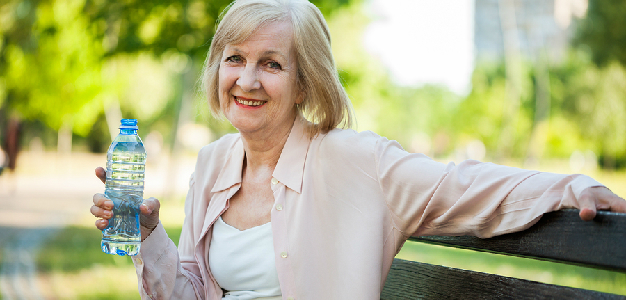Lately I’ve heard of two women in their 60s and 70s who’ve gotten dehydrated, to their surprise. But as we get older dehydration is a greater risk.
Most of us know — even if we sometimes forget — that water keeps our kidneys healthy and helps us to avoid cramps, headaches, constipation and urinary infections.
In addition, it can support weight loss because water fills us up, so we eat less. If you feel hungry between meals, it’s a good strategy to have a glass or two of water before you reach for food.
But what few of us appreciate is that staying well hydrated is also beneficial for our heart and blood vessels.
Dehydration thickens our blood, and thicker blood is harder to pump. Our hearts have to work more, and we’re more susceptible to clots, plaque and inflammation.
Joints are affected by lack of water too. Cartilage holds a lot of water and when we’re dehydrated it can dry out and deteriorate.
So it pays to drink enough, but how much is that?
We’re used to being told to drink eight glasses a day. Like a lot of things, there’s no scientific fact behind that. But at least it communicates that we need more than a couple. Especially at this time of year.
I wish it was as easy as letting thirst be our guide. Some people might be good at that, but they’d be a minority. Especially when we’re busy and have other things on our minds few of us are focused on our thirst.
One of the women I referred to had gone shopping. It took a lot longer than she expected and if she thought about drinking at all, she might’ve thought she’d do that when she got home. In the end she needed to see a doctor before she made it home.
Thirst is also a less reliable indicator when we’re older. For some of us our sense of thirst won’t be as sharp as it used to be. Or rather than lack of water showing up as a dry mouth, it might present as a feeling of weariness, dullness or light-headedness. It could be easy to think you just need a good lie down.
Hydration monitors — worn on our wrists like step-counting devices — may not be far off, but without that kind of prompt we need to do whatever it takes to make regular water drinking a habit. Even when we’re doing things like shopping.
It’s also important to monitor the colour of your urine, but be aware that when you’re dehydrated you won’t produce much (ditto for sweat) because your body is holding on to all the water it can get.
There are other reasons that dehydration is a greater risk with age. Our bodies don’t have the same water reserves as they did when we were younger, and some medications — such as those for high blood pressure — increase our water loss by increasing our urine output.
Finally, a big and hidden issue is the number of women who restrict the amount of water they drink because they’re worried about making it to the toilet in time.
If you’re in that boat, see a pelvic floor physio and get on top of the problem.
Don’t limit your water intake, because drinking enough of it is one of the simplest things we can do to age healthily.

